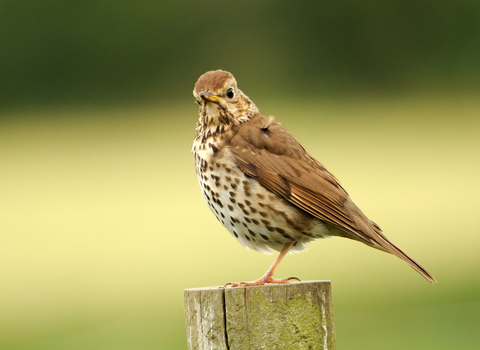
Song thrush ©Amy Lewis
Song thrush
The song thrush is a familiar garden visitor that has a beautiful and loud song. The broken shells of their blue, spotty eggs can often be found under a hedge in spring.
Scientific name
Turdus philomelosWhen to see
January to DecemberTop facts
Stats
Length: 23cmWingspan: 34cm
Weight: 83g
Average lifespan: 3 years
Classified in the UK as Amber under the Birds of Conservation Concern 5: the Red List for Birds (2021). Protected in the UK under the Wildlife and Countryside Act, 1981. Priority Species under the UK Post-2010 Biodiversity Framework.
About
The song thrush is a small, familiar songbird, commonly found in parks and gardens, woodland and scrub. Living up to its common name, it has a beautiful, loud song with repeating phrases. Widespread throughout Europe, and as far east as Siberia, northern populations are migratory, heading to Africa, whereas our song thrushes tend to be residents. From March until April, song thrushes breed, often producing three broods of up to five blue, spotty eggs.What to look for
The song thrush is a familiar bird, brown above, with a white belly covered in black, drop-shaped spots. It is smaller and a warmer brown than the mistle thrush, and lacks the white eyestripe and red flank patches of the redwing.Where to find
Widespread.Did you know?
Song thrushes will eat all kinds of food, but earthworms make up a large part of their diet. When the ground becomes too hard to get at them, song thrushes will eat snails instead. To get at the meat inside, they take the shell and crack it open by banging it against a stone 'anvil'. This behaviour is unique to these birds.Watch
Song thrush singing (c)Tom Hibbert (https://vimeo.com/413125593)
Song thrush singing by Tom Hibbert
